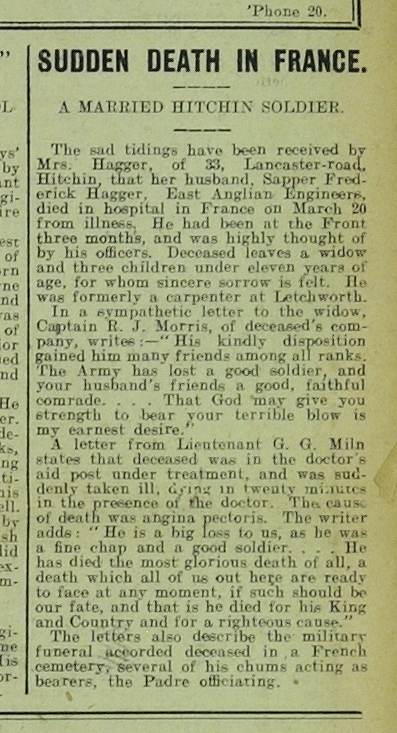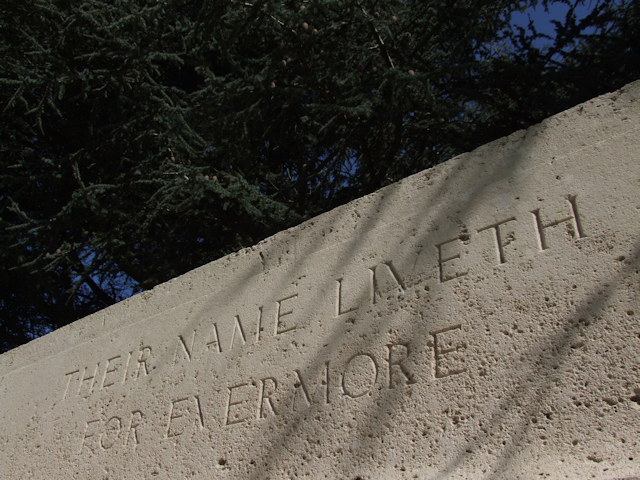Name
Frederick Hagger
Circa 1881
Conflict
First World War
Date of Death / Age
29/03/1917
Rank, Service Number & Service Details
Private
57855
Cheshire Regiment
16th Bn.
Awards: Service Medals/Honour Awards
British War and Victory medals
Cemetery/Memorial: Name/Reference/Country
MESNIL-ST. NICAISE CHURCHYARD
Near North West corner.
France
Headstone Inscription
Not Researched
UK & Other Memorials
Hitchin Town Memorial, St Mary's Church Roll of Honour, Hitchin
Pre War
Wartime Service
After enlistment he went into the Army reserve and was embodied on 26 May 1916 and posted for training. He was originally 3778 in the 2/2nd Royal Engineers (East Anglian Engineers) and remained with them for some time, receiving a grade or rating of 6th on 23 May 1916, 5th and an increase of engineers pay on 20 June 1916. He was then grated to 4th on 22 July 1916.
He was posted to the 5th Cheshires on 30 December 1916 – the day he sailed from Southampton, landing in Rouen, France on 31st. He was then posted to the 16th Cheshires on 13 January 1917 as Private 57855.
It was reported, in the local papers, that he had only been at the front for three months when he had an attack of angina pectoris and although he was taken to an aid post he died in twenty minutes.
The circumstances of his death were uncertain and, very unusually, they were the subject of a Court of Enquiry ordered by Lt. Col. B C Dent, Commanding 16th Bn.. The Cheshire Regiment, just two days after his death. This is extensively reported in Fred’s service record.
Fred had been sent back from a working party on the 28th as he was suffering from diarrhoea. The Medical Officer (MO) was not available, the MO Orderly so he was advised to return to his billets. He then began to complain of pains to his shoulder and chest. The MO saw him on the morning of the 28th, when his temperature was found to be normal, but he was still in pain. The Orderly visited him at 7:30pm and found that the diarrhoea was less acute and he wasn’t complaining of pain. However, the Orderly was sent for again at about 11:30am on the 29th as Fred seemed very ill. He found Fred’s pulse to be feeble and called the MO.
The medical officer, Capt. F N Stewart, stated that he had seen Fred at about mid-day of the day of his death (29th). Fred was complaining of a pain in his right shoulder and had gone to the latrine and came back complaining of great pain in his chest, and he sat by the fire before taking to his bed, when the pain got worse the doctor was sent for and saw him at about 12:10 and found Fred to have died.
The Court considered the evidence and decided the death was a result of natural causes.
He was given a military funeral in a cemetery in France and he was buried in Mesnil-St-Nicaise Churchyard, Somme in France, near North West corner.
His widow received two letters. Captain R. J. Morris of the deceased's company wrote: “His kindly disposition gained him many friends among all ranks. The army has lost a good soldier, and your husband’s friends a good faithful comrade. . . . That God may give you strength to bear your terrible blow is my earnest desire.”
Lieutenant G. G. Mill stated that Fred was in the doctors aid post under treatment, and was suddenly taken ill, dying in 20 minutes in the presence of the doctor. The cause of death was angina pectoris. The writer added “He is a big loss to us, as he was a fine chap and a good soldier. . . . . He has died the most glorious death of all, a death which all of us out here are ready to face at any moment, if such should be our fate, and that is he died for his king and country in a righteous cause."
Additional Information
After his death £3 9s 5d was authorised to go to his widow on 10 July 1917 Later, a war gratuity of £3 was authorised to be paid to her, on 27 October 1919.
His widow was sent Fred’s personal property on 10 July 1917 at which time she was living at 55 Queens Road, Old Fletton, Peterborough. His death plaque was sent on 13 October 1920.
Acknowledgments
David C Baines, Jonty Wild



